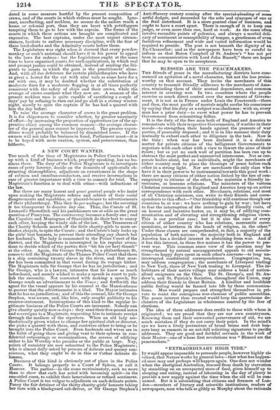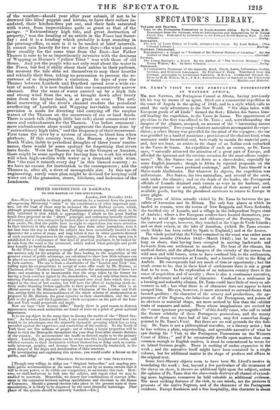"EXTRAORDINARY HIGH TIDE."
1r would appear impossible to persuade people, however highly vilized, that Nature works by general laws—that what has happen- ed once may and perhaps will happen again. One does not wonder when the aboriginal Australian, rescued from death by starvation by stumbling on an unexpected store of food, boives himself up to sleeping and eating, instead of labouring in the day of plenty to provide a new supply against the time when the old will be con. sumed. But it is astonishing that citizens and freemen of Lon- don—members of literary and scientific institutions, readers of newspapers, men who talk as glibly as Murphy about the rationale of the weather—should year after year submit, if not to be drowned like blind puppies and kittens, to have their cellars in- undated, their kitchen-fires put out, and their beds saturated with water, from improvidence quite as great as that of the savage. " Extraordinary high tide, and great destruction of property," was the heading of an article in the Times last Satur- day ; and it is a heading which probably is kept standing in the printing-office, so sure is it to be needed at brief intervals. It cannot rain heavily for two or three days—the wind cannot blow steadily for the same time from the East—but Father Thames is sure to be as impertinently intrusive with the denizens of Wapping as Horace's "yellow Tiber" was with those of old Rome. And yet the people who not only read about the water in the Times, but feel it chilly about their ankles in their parlours, the moment the tide ebbs set themselves to mop their hearths and rekindle their fires, taking no precaution to prevent the re- currence of so disagreeable a visitation. In days of yore the Thames between Lambeth and Deptford spread over a wide ex- tent of marsh : it is now banked into one comparatively narrow channel. But the mass of water carried up by a high tide and strong wind from the sea, or brought down after heavy rains from the higher lands, is as great as ever. The arti- ficial narrowing of the river's channel renders the periodical overflowing of Lambeth and Wapping inevitable, unless some provision is made for diverting and carrying off the surplus waters of the Thames on the occurrence of sea or land floods. There is much talk (though little but talk) about ornamental ter- races and embankments for the Thames. Use before ornament : mere embankments alone would aggravate the damage done by " extraordinary high tides," and the frequency of their recurrence. First tame the river by a system of sluices, to bleed him when plethoric. If this country were, like Buenos Ayres or New South Wales, liable to periodical droughts of three years' contin- uance, there would be some apology for forgetting that rivers have floods. Were the Thames as big as the Ganges or Amazon, there might be some apology for leaving him to work his wicked will when high-swollen with water as a drunkard with wine. But "the rain it raineth every day" in this blessed country : so we have no excuse for inattention to the consequences ; and the Thames is, after all, a river of manageable size. In this age of engineering, surely some plan might be devised for keeping cold water out of the granaries, stores, kitchens, and bedrooms of the
Londoners.



























 Previous page
Previous page